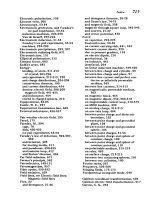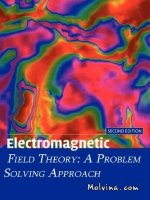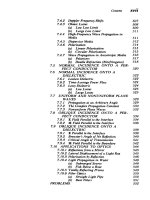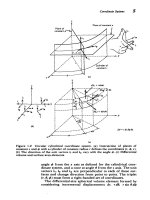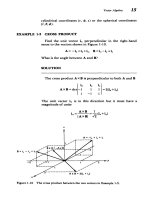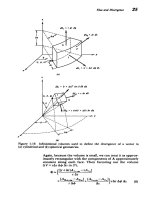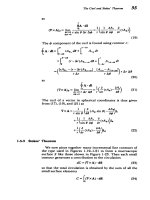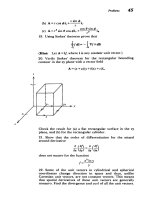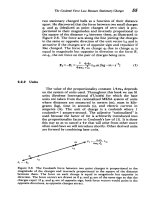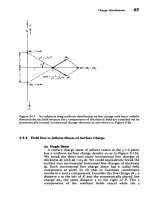Electromagnetic Field Theory: A Problem Solving Approach Part 42 ppt
Bạn đang xem bản rút gọn của tài liệu. Xem và tải ngay bản đầy đủ của tài liệu tại đây (307.34 KB, 10 trang )
Problems
385
a
I
Hoi
(c)
Repeat
(a)
and
(b)
if
we
have
an
infinite
array
of
such
dipoles.
Hint:
n=1
n
(d)
If
we
assume
that there
is
one
such
dipole
within
each
volume
of
a
3
,
what
is
the
permeability
of
the
medium?
23.
An
orbiting
electron
with
magnetic
moment
mi,
is
in a
uniform
magnetic
field
Boi,
when
at
t
=
0
it
is
slightly
dis-
placed
so
that
its
angular momentum
L
=
-(
2
me/e)m now
also
has
x
and
y
components.
(a)
Show
that
the
torque
equation
can
be
put
in
terms
of
the
magnetic moment
dm
-=
-ymxB
where
y
is
called
the gyromagnetic
ratio.
What
is
y?
(b)
Write
out
the
three
components
of
(a)
and
solve
for
the
magnetic
moment
if
at
t
=
0
the
moment
is
initially
m(t
=
0)
=
mxoi,
+
m•
0
i,
+
moi,
(c)
Show
that
the
magnetic
moment
precesses
about
the
applied
magneticfield.
What
is
the
precessional
frequency?
24.
What
are
the
B,
H,
and
M
fields
and
the
resulting
magnetization
currents
for
the
following
cases:
(a)
A
uniformly
distributed
volume
current
Joio
through
a
cylinder
of
radius
a
and
permeability
AL
surrounded
by
free
space.
(b)
A
current
sheet
Koi,
centered
within
a
permeable
slab
of
thickness
d
surrounded
by
free
space.
386
Th
Magetic
'Field
Joiz
T
Uo
y
"• d
(a)
(b)
Section
5.6
25.
A
magnetic
field
with
magnitude
H
1
is
incident
upon
the
flat
interface
separating
two
different
linearly
permeable
materials
at an
angle
01
from
the
normal.
There
is
no surface
H,
current
on
the
interface.
What
is
the
magnitude
and
angle
of
the
magnetic
field
in
region
2?
26.
A
cylinder
of
radius
a
and
length
L
is
permanently
magnetized
as
Moi,.
(a)
What
are
the
B
and H
fields
everywhere
along
its axis?
(b)
What
are
thý
fields
far
from
the
magnet
(r
>
a,
r
>
L)?
(c)
Use
the
results
of
(a)
to
find
the
B
and H
fields
every-
where
due
to
a
permanently
magnetized
slab
Moi,
of infinite
xy
extent
and
thickness
L.
(d)
Repeat
(a)
and
(b)
if
the.
cylinder
has
magnetization
Mo(1
-
r/a)i,.
Hint:
dr
(a
i/2
=
In
(r
+
V7)
_~_I ·_~·
·__
I
Problems
A
87
Section
5.7
27.
A
z-directed
line
current
I
is
a
distance
d
above
the
interface
separating
two
different
magnetic
materials
with
permeabilities
1L
and
122.
(a)
Find
the
image
currents
I'
at
position
x
=
-d
and
I"
at
x
=
d
that
satisfy
all
the
boundary
conditions.
The
field
in
region
1
is
due
to
I
and
I'
while
the
field in
region
2
is
due
to
I".
(Hint:
See
the
analogous
dielectric
problem
in
Section
3-3-3.)
(b)
What
is
the
force
per
unit
length
on
the
line
current
I?
28.
An
infinitely
long
line
current
I
is
parallel
to
and
a
distance
D
from
the
axis
of
a
perfectly
conducting
cylinder
of
radius
a
carrying
a
total
surface
current
1
o.
(a)
Find
suitable image
currents
and
verify
that
the
bound-
ary
conditions
are
satisfied.
(Hint:
xi,-vi,=ri#;
i,=
sin
gir
+cos
46i;
x
=
r
cos
4.)
388
The
Magnetic
Field
to
KO
=
2ira
*l
D )
(a)
(b)
What
is
the
surface
current
distribution
on
the
cylin-
der?
What
total
current
flows
on
the
cylinder?
Hint:
f
dO
2
tan
([a
2
- b
2
"
2
tan
(t)
Ja+bcost
[a
2
-b]
t
a n
(a+b)
)
(c)
What
is
the
force
per
unit
length
on
the
cylinder?
(d)
A
perfectly
conducting
cylinder
of
radius
a carrying
a
total
current
I
has
its
center
a
distance
d
above
a
perfectly
conducting
plane. What
image
currents
satisfy
the
boundary
conditions?
(e)
What
is
the
force
per unit
length
on
the
cylinder?
29.
A
current
sheet
K
0
cos
ayi,
is
placed
at
x
=
0.
Because
there
are
no
volume
currents for
x
#
0,
a
scalar
magnetic
potential
can
be
defined
H
=
Vx.
~l~g~g~f~i~B~O
~ oo~
r
~I
Problems
389
Ko
cosayi
z
d
J
)
d' sKW'
(a)
What
is
the
general
form
of
solution
for
X?
(Hint:
See
Section
4-2-3.)
(b)
What
boundary
conditions
must
be satisfied?
(c)
What
is
the
magnetic
field
and
vector
potential
every-
where?
(d)
What
is
the equation
of
the
magnetic
field
lines?
30.
A
slab
of
thickness
d
carries
a
volume
current
distribution
Jo
sin
axiz
and
is
placed
upon
a
perfectly
conducting
ground
plane.
(a)
Find
a
particular
solution
for
the
vector
potential.
Are
all
the
boundary
conditions
satisfied?
(b)
Show
that
additional
solutions
to
Laplace's
equations
can
be
added
to
the
vector
potential
to satisfy
the
boundary
conditions. What
is
the
magnetic
field
everywhere?
(c)
What
is
the
surface
current
distribution
on
the
ground
plane?
(d)
What
is
the
force
per
unit
length
on
a
section of
ground
plane
of
width
21r/a?
What
is
the
body
force
per
unit
length
on
a
section
of
the
current
carrying
slab
of
width
2ir/a?
(e)
What
is
the
magnetic
field
if
the
slab
carries no
current
but
is
permanently
magnetized
as
Mo
sin
axiy
Repeat
(c)
and
(d).
31.
A
line
current
of
length
L
stands
perpendicularly
upon
a
perfectly
conducting
ground
plane.
0
-~ 00
·
j:):C:i·:·~~·:_::i·j·::i·/·X·:j··l·/~/~
I
i·l:·;i::;::il·(··C··~::i·:·;:i:·.:;:···
7,::
jot
5
C
I
390
MII
(a)H
(a)
Cylinder
has
permeability
2&2
and
surrounding
medium
has
permeability
j1.
(b)
Perfectly
conducting
cylinder
in
free
space.
(c)
Uniformly magnetized
cylinder
M
2
i, in
a
uniformly
magnetized
medium
Mli
33.
A
current
sheet
Kois
is
placed
along
the
y
axis.
at
x
= 0
between
two
parallel perfectly
conducting
planes
a
distance
d
apart.
d
a oo
(a)
Write
the
constant
current
at
x
=
0
as
an
infinite
Fourier
series
of
fundamental
period
2d.
(Hint:
See
Section
4-2-5.)
(b)
What
general
form of
a
scalar
potential
X,
where
H
=
VX,
will
satisfy
the
boundary
conditions?
(c)
What
is
the
magnetic
field
everywhere?
The
Magnetic
Field
(a)
Find
a
suitable
image
current
that
is
equivalent
to
the
induced
current
on
the
z
=
0
plane.
Does
the
direction
of
the
image
current
surprise
you?
(b)
What
is
the
magnetic
field
everywhere?
(Hint:
See
Section
5-4-3a.)
(c)
What
is
the
surface
current
distribution
on
the
conducting
plane?
32.
A
cylinder
of
radius
a
is
placed
within
a
uniform
magnetic
field
Hoi,.
Find
the
magnetic
field
for
each
of
the
following
cases:
Problems
391
(d)
What
is
the surface
current
distribution
and
the
total
current
on
the
conducting
planes?
Hint:
n=l
n
8
(n
odd)
Section
5.8
34.
An
infinitely
long
cylinder
of
radius
a
is
permanently
mag-
netized
as
M,,i,.
(a)
Find
the
magnetic
field
everywhere.
(b)
An
infinitely
long
line
current
I
is
placed
either
at
y
=
-b
or
at
x
=
b
(b
>
a).
For
each of
these
cases,
what
is
the
force
per
unit
length
on
the
line
current?
(Hint:
See
problem
32c.)
35.
Parallel
plate
electrodes are
separated
by
a
rectangular
conducting
slab
that
has
a
permeability
A.
The
system
is
driven
by
a
dc
current
source.
L3
•JtlJ
13
(a)
Neglecting
fringing
field effects
assume
the
magnetic
field
is
H,(x)iz.
If
the
current
is
uniformly
distributed
throughout
the
slab,
find
the
magnetic
field
everywhere.
(b)
What
is
the
total
force on
the
slab?
Does
the
force
change
with
different
slab
permeability?
Why
not?
ePL-'ll
I
392
The
Magnetic
Field
36.
A
permeable
slab
is
partially
inserted
into
the
air
gap
of
a
magnetic
circuit
with
uniform
field
Ho.
There
is
a
nonuniform
fringing
field
right
outside the magnetic
circuit
near
the
edges.
Hlx-r
oo)O
Ho
o
t
x
(a)
What
is
the
total
force
on
the
slab
in
the
x
direction?
(b)
Repeat
(a)
if
the
slab
is
permanently
magnetized
M=
M
o
i,.
(Hint:
What
is
Hx(x
=
-oo)?
See
Example
5-2a.)
chapter
6
electromagnetic
induction
394
Electromagnetic
Induction
In
our
development
thus far,
we
have
found
the
electric
and
magnetic
fields
to
be
uncoupled.
A
net
charge
generates
an
electric
field
while
a
current
is
the
source of
a
magnetic
field.
In
1831
Michael
Faraday experimentally
discovered
that
a
time
varying magnetic
flux
through
a
conducting
loop
also
generated
a
voltage
and
thus
an
electric
field,
proving
that
electric
and
magnetic
fields
are
coupled.
6-1
FARADAY'S
LAW
OF INDUCTION
6-1-1
The
Electromotive Force
(EMF)
Faraday's
original
experiments
consisted
of
a
conducting
loop
through
which
he
could
impose
a
dc
current
via
a
switch.
Another
short
circuited
loop
with
no
source
attached
was
nearby,
as
shown
in
Figure
6-1.
When
a
dc
current
flowed
in
loop
1,
no
current
flowed
in
loop
2.
However, when
the
voltage
was
first
applied
to
loop
1
by
closing
the
switch,
a
transient
current
flowed
in
the
opposite
direction
in
loop
2.
Positive
current
is
induced
to
try
to
keep
magnetic
flux
equal
to
a non-zero
constant
Negative
current
is
induced
to
try
to
keep
magnetic
flux
equal
to
zero
Figure
6-1
Faraday's
experiments
showed
that
a
time
varying magnetic
flux
through
a
closed
conducting
loop
induced
a
current
in
the
direction
so
as
to
keep
the
flux
through
the
loop
constant.
-·r· -·-
